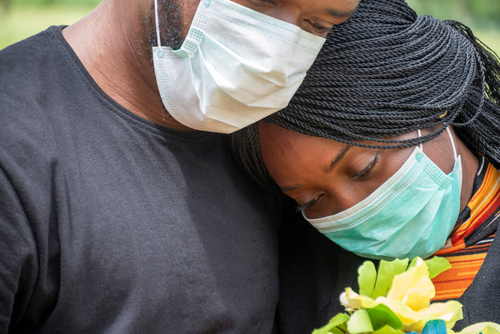Today we discuss ways to communicate a death on your team. It’s an extremely sensitive topic that affects everyone differently. There is no one right way to respond; however, there are a handful of wrong ways. And while we hope it never happens, we want to share our thoughts in case death or something similarly tragic impacts your [business] family:
 One of our clients recently had a team member pass away unexpectedly. Through project work we had grown close, so the loss was felt by our extended team. With permission from the individual’s family, management quickly took a people-first approach to communicating the news: speaking to team members in-person; allowing the opportunity to talk/process out-loud; and promising to share updates. It is said during times like this that people won’t remember what you said, but how you made them feel. This is true for the smallest tasting room to the biggest corporation.
One of our clients recently had a team member pass away unexpectedly. Through project work we had grown close, so the loss was felt by our extended team. With permission from the individual’s family, management quickly took a people-first approach to communicating the news: speaking to team members in-person; allowing the opportunity to talk/process out-loud; and promising to share updates. It is said during times like this that people won’t remember what you said, but how you made them feel. This is true for the smallest tasting room to the biggest corporation.
Again, there’s no script for this. Management spoke from the heart and reiterated the value of every person. Team members were given the space to begin the grieving process. There were conversations about a visual tribute in the tasting room and attending services as a team. This email highlights the very important differences between information shared internally with team members and what’s communicated to the public via digital/social channels and the press.
what to say
Sharing the news with team members can be among the hardest conversations you ever have. You may share personal stories, laugh, cry and experience the full range of emotions, and that’s okay! Your team’s grieving process should be protected from people outside the immediate situation. This means sharing a different message with customers, partners and the industry and taking private or personal conversations offline. With permission from the individual’s family, we recommend sticking with the facts for social posts, email or digital/blog entries:
- Team member’s name: use full name for first reference, then any nicknames
- Role or title in the business
- Timeframe for working: if less than a year, it’s okay to leave this out
- Hobbies, interests or pursuits outside of the business
- Date of passing
- Work photo: one that captures the individual’s spirit and personality
How do you open or close a post like this? Phrases like, “it’s with a heavy heart that we share the following news,” and, “our thoughts are with friends and family during this time,” go a long way to show the outside world how you’re dealing with the loss. It’s important to refrain from sharing too much detail, which may come across as insensitive. Friends and fans of your business may want to post photos of the deceased: be sure to thank them for taking the time to share their special memory. Consider drafting a script with these and other talking points for all team members to use when asked.
what not to say
Just as important as knowing what to say, is knowing what NOT to say in situations like this. Protecting team member privacy should be your primary concern. You should only communicate details about the individual with approval from the family. This can be especially difficult when it’s your responsibility to inform others outside the organization while you’re still working through stages of grief yourself. When deciding what to post or how to respond to questions about news of your loss, consider:
Has someone closest to the deceased approved exactly what I’m about to say?
We’re not talking about would they approve: this means you haven’t asked. Or something similar versus exactly: that means you’re guessing. Management must not only establish the guidelines for team members, but lead by example. The same script that provides instruction on what is appropriate to say can help identify those details best communicated by family members, if at all:
- Cause of death
- Details of last shift at the facility
- Partners, spouses or family members by name
- GoFundMe or other crowdsourcing initiatives: best to share this information privately versus broadcasting publicly
- Anything related to COVID-19 vaccination
Out of respect, pause any outbound communications for open positions for at least a week following the event. Review your current content calendar to avoid posting anything that could be misinterpreted as insensitive. And remove any derogatory or inappropriate comments immediately, especially those that degrade the individual’s character.
when to tell the industry
 Press releases are a valuable way to inform the greater craft beverage industry of new product releases, tasting room expansions and other business events. We’ve also discussed pandemic-era announcements like [re]openings and positive COVID-19 tests. But where does tragedy like the death of a team member fit in? It’s best to think objectively about whether or not the loss is newsworthy to the journalist receiving the press release. This is not a comment on the value or impact of an individual’s life, but the reach of the story. When deciding whether a press release is warranted, ask yourself whether the individual was:
Press releases are a valuable way to inform the greater craft beverage industry of new product releases, tasting room expansions and other business events. We’ve also discussed pandemic-era announcements like [re]openings and positive COVID-19 tests. But where does tragedy like the death of a team member fit in? It’s best to think objectively about whether or not the loss is newsworthy to the journalist receiving the press release. This is not a comment on the value or impact of an individual’s life, but the reach of the story. When deciding whether a press release is warranted, ask yourself whether the individual was:
- Known more broadly in the industry
- A spokesperson or public-facing representative for your business
- Award-winning at a state or national craft beverage competition
The criteria apply to everyone from owner to tasting room team member – it’s based on public visibility, not role. And ultimately the size of the audience that would be impacted by news of their passing. If the individual fits two of the above three criteria, you likely want to notify your current list of media contacts using your standard press release template. Your first paragraph will be the statement of fact; second will be a quote from the owner or direct manager; third will be a list of contributions and accomplishments; and fourth is a third-party statement from someone notable in the craft beverage industry. If the family permits it, a fifth paragraph could include information about services, charities or donations in memoriam.
It’s worth noting that sometimes you don’t control details of the story getting out to press. As an example, the brewing community experienced a tragedy in November, 2020, with the passing of Jason Buehler from Denver Beer Co. His was a more publicly-visible event, reported by the Pitkin County Sheriff’s Office to the Associated Press. Journalists from a number of states other than Colorado picked up the story, giving it nationwide attention. While Denver Beer was undoubtedly protective of the family he left behind, they also were tasked with helping manage the huge outpouring of nationwide support from friends in the industry. From an outsider’s perspective, they have managed both with grace and respect for their lost brewer.
MailChimp archive:
https://mailchi.mp/f6ae310ce2ad/210426_dealingwithtragedy?e=bd76eedb35
Download:
https://app.box.com/s/odtqonpyb7zmxgggsdp6goqp8t2030ku



